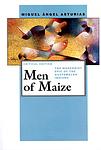The Greatest Argentinian, Guatemalan "Allegorical, Fiction" Books Since 1900
Click to learn how this list is calculated.
This list represents a comprehensive and trusted collection of the greatest books. Developed through a specialized algorithm, it brings together 305 'best of' book lists to form a definitive guide to the world's most acclaimed books. For those interested in how these books are chosen, additional details can be found on the rankings page.
Genres
Allegorical books are a genre of literature that use symbolic characters, events, and settings to convey a deeper meaning or message. These stories often have a moral or philosophical lesson that is meant to be interpreted by the reader. Allegories can be found in many different types of literature, including novels, short stories, and poetry. They are a powerful tool for exploring complex ideas and emotions, and can be used to comment on social, political, or religious issues. Overall, allegorical books are a thought-provoking and engaging genre that challenges readers to think critically and reflect on the world around them.
Countries
Date Range
Reading Statistics
Click the button below to see how many of these books you've read!
Download
If you're interested in downloading this list as a CSV file for use in a spreadsheet application, you can easily do so by clicking the button below. Please note that to ensure a manageable file size and faster download, the CSV will include details for only the first 500 books.
Download-
1. The President by Miguel Angel Asturias
The novel in question is a gripping political drama set in an unnamed Latin American country, where a ruthless dictator wields absolute power. The narrative delves into the dark and corrupt world of political machinations following the assassination of a colonel, which triggers a series of events that expose the brutal and oppressive regime. Through the eyes of various characters, including the paranoid president, the falsely accused, and the oppressed citizens, the story explores themes of power, fear, and injustice, painting a vivid picture of a society under the thumb of a tyrannical leader. The book is a powerful critique of dictatorship and a poignant exploration of the human cost of absolute power.
The 1892nd Greatest Book of All Time -
2. The Censors by Luisa Valenzuela
"The Censors" is a satirical short story that delves into the life of a man who takes a job as a censor at a government agency in an attempt to intercept and approve his own letter, which he had previously sent abroad. As he becomes increasingly absorbed in his role, he starts to censor letters with zeal, losing sight of his original purpose. The story serves as a cautionary tale about the corrupting influence of power and the ease with which one can become complicit in oppressive systems, ultimately leading to a grim and ironic conclusion where the protagonist falls victim to the very system he sought to manipulate.
The 3695th Greatest Book of All Time -
3. The Impenetrable Madam X by Griselda Gambaro
"The Impenetrable Madam X" is a provocative play that delves into the complexities of human relationships and societal expectations. Set against a backdrop of surrealism and absurdity, the narrative follows the titular character, a woman shrouded in mystery and power, who interacts with various other characters in a series of disjointed scenes. Through sharp dialogue and symbolic interactions, the play explores themes of identity, power dynamics, and the struggle for understanding within the confines of a world that oscillates between the real and the fantastical. The work challenges audiences to question the nature of reality and the masks people wear in their daily lives.
The 4787th Greatest Book of All Time -
4. Men Of Maize by Miguel Angel Asturias
The book is a magical realist novel that delves into the lives, traditions, and struggles of the indigenous people of Guatemala, intertwining their personal stories with the mythic and spiritual beliefs rooted in their connection to the land, particularly the cultivation of maize. The narrative, rich in symbolism and poetic language, explores the impact of modernization and exploitation on rural communities, critiquing the forces of colonialism and capitalism that disrupt the harmony between humans and nature. Through a series of interconnected tales, the novel paints a vivid portrait of a culture in transition, grappling with the loss of its identity and the fight to preserve its heritage.
The 7168th Greatest Book of All Time
Reading Statistics
Click the button below to see how many of these books you've read!
Download
If you're interested in downloading this list as a CSV file for use in a spreadsheet application, you can easily do so by clicking the button below. Please note that to ensure a manageable file size and faster download, the CSV will include details for only the first 500 books.
Download

